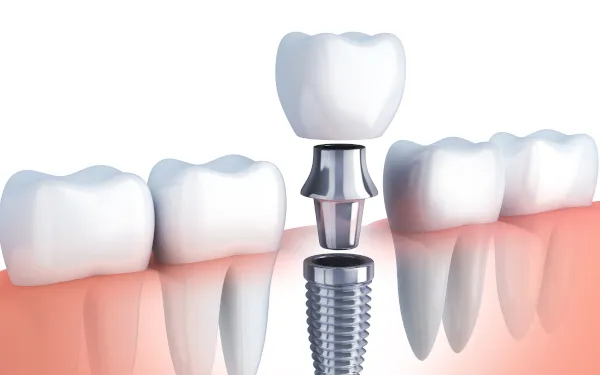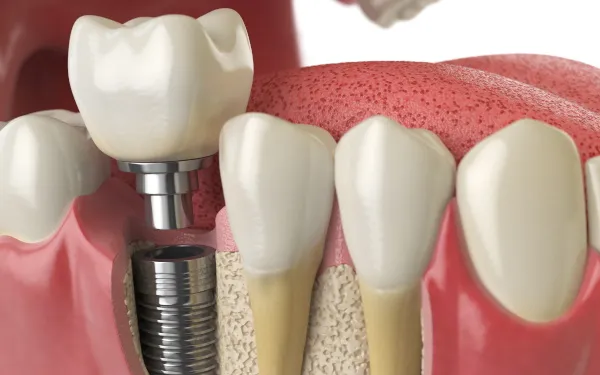| Procedure | Dental Implant |
| Number of Visit | 2 (5-7 Days) |
| Number of Appointment | 6 |
| Procedur Time | 2-4 Hours |
| Anaesthetic Type | Local |
| Recovery Time | 3 Months |
Get a special offer for your treatment now
Content
- What is a Dental Implant?
- How the Dental Implants are made?
- What are Dental Implants used for?
- Whom can be applied Dental Implant Treatment?
- How Long Dental Implant Treatment Takes?
- How Long is Dental Implant’s Life Cycle?
- Points to take into consideration After Implant
- Why Turkey for Dental Implants?
- Frequently Asked Questions About Dental Implants
Dental implant is one of the best treatment options applied today to replace one or more missing teeth. It aims to restore the patient to chewing function and old aesthetics. Teeth placed with dental implants are often difficult to distinguish from natural teeth.

What is a Dental Implant?
Dental implants are artificial roots made of titanium, which are used to replace teeth lost for different reasons. Implantology is the treatment of tooth loss and includes a number of diagnostic tools and surgical techniques. Dental implant treatment consists of replacing the missing tooth with a titanium screw and fixing a crown or permanent denture on it.
Teeth loss can be caused by poor oral hygiene, periodontal problems, lack of preventive treatments and trauma. Teeth loss even may occur in old ages. In such and similar cases, dental implants are used as a solution to the problem.
The main point is not to compromise on health in general, but also absence of teeth directly affects the self-esteem.
How the Dental Implants are made?
How the dental implants are made? Before answering this question, let us remind that this procedure should be applied by dentists who are experts in this area. Because, Dental Implant application requires a strict surgical protocol in order to hold the implant properly in the bone. In Dental Implant surgery, after the normal procedures related to aseptic conditions (disinfection) and preventive treatments, the procedure is started with local anesthesia.
Detailed examination and X-rays are required before starting treatment. Measurements of jaw bones and other teeth are taken. After anesthesia, the bone area where the implant is planned to be made is uncovered by cutting the gums and a hole or canal is opened into this bone with the help of special drills.
After the implantation process, the gums are sewn and natural osteointegration (knit) of the implant will be waited.

What are Dental Implants used for?
Dental implants are used to replace lost roots of missing teeth or to increase the adherence function of removable full prostheses known as palate prostheses. Implants can be applied for full mouth if there is sufficient space on the jawbone.
Whom can be applied Dental Implant Treatment?
Implant treatment can be applied to anyone who has completed the age of 18 and whose jaw and face development has completed. The suitability of the jaw structure is determined by X-rays and examinations before treatment.
The following points should be taken into the consideration:
- Patients using blood thinners (anticoagulants) should stop using their medications some time before treatment. For this purpose, the opinion of relevant physician should be taken
- For diabetics, if the disease is progressed, it is waited until it is reduced to a certain level and order. Treatment can be applied at the appropriate time.
- Patients with osteoporosis can have implants after receiving the relevant treatment and having the physician's approval
How Long Dental Implant Treatment Takes?
The duration of Dental Implant treatment depends on patient’s condition and the bone structure of the area to be implanted. It can usually be done in one session on the same day.
How Long is Dental Implant’s Life Cycle?
Implants can be used for life as long as regular controls are made and oral hygiene is cared.
Points to take into consideration After Implant
For a healthy and long-lasting use, it is necessary to follow the medical advises to be made by your physician after implant treatment. As a general rule, nothing worrisome happens after dental implant procedure and does not require any recovery or sick leave during the postoperative period. In other words, recovery after implant treatment become almost instantly and the patient can continue her/his normal life as long as she/he follows the recommendations provided by the dentist.
To minimize some risks and complications, the followings must be taken into the consideration by the patient after dental implant treatment:
- Take the medications prescribed by the physician in a timely manner;
- Apply ice on the intervention area as it is described by the physician;
- Avoid sudden head movements and more intense physical activities;
- Avoid exposure to the sun and heat sources;
- Strengthen oral health care;
- Choose a softer or pastiness diet for 1-2 weeks after treatment.
Why Turkey for Dental Implants?
Turkey comes to the forefront with its many advantages for dental implant treatment. In addition, it closely follows world standards in implant technology and is advanced in treatment techniques in comparison with many other countries.
Turkey is the shining star of implant treatment due to its easy-to-reach central location, domestic transportation facilities and very advantageous costs compared to international treatment prices.
The advantages of dental implant treatment in Turkey can be listed as follows:
- Easy planning: For you to be in any country in the world does not prevent us from planning and submitting our price offers to you
- Easy appointment: After the pre-interview and planning stages, an appointment is created for the date that is most convenience for you.
- Airport transfer: Airport transfer service is provided for all our guests who come to Antalya for implant treatment in Turkey
Frequently Asked Questions About Dental Implants
The most obvious problem of missing teeth is the loss of chewing function and the deterioration of the smile-aesthetics.
However, if treatment is not started in a timely manner, it will cause other problems. For example:
- The remaining teeth are relocated towards to empty areas,
- Aesthetic deterioration,
- Wear of teeth supporting the load of missing teeth,
- Bone loss in the jaw, etc.
The answers of some frequently asked questions about implant treatment are as follows:
- Can Implants to be applied to everyone?
Implant treatment can be applied to patients of all ages who have completed their bone and jaw development. Some diseases may require the examination and approval of relevant physician before treatment.
- How Many Implants do I Need?
How many implants are needed can be determined by the examinations to be performed by a dentist. In general, it depends on the bone quality, the number of teeth needed and type of the prosthesis to be made.
- Are the Implants Durable?
Implants are produced by highly durable titanium or zirconium materials and are much more robust than anticipated. Over time, it begins to knit, becoming just like the bone and being able to act as a completely normal tooth root.
- Do Implants Fall Out?
The implant may fall if it is not able to perform the knit process with the maxillary or jawbone in which it is placed. However, for an implant knitted with bone, a fall is out of the question.
- How many teeth can be replaced with Dental Implants?
Thanks to dental implants, all needed teeth can be replaced. This depends on the suitability of the patient’s bone and jaw structure. In case all the teeth are missing, it is also possible to place all teeth through implants in patients who are completely toothless.
- Will I Feel Discomfort During Implant Application?
Current surgical procedures that are performed during implant application are performed painless and afflictionless under local anesthesia. When the effect of anesthesia wears off, approximately after three or four hours, the patient may feel some discomfort. The level of discomfort may vary from patient to patient. However, for most patients, these pains can be prevented with a suitable painkiller recommended by the physician.
- What are Bone Grafting and Sinus Lifting?
In order to apply an implant without problems, the bone in the relevant area may need to be enlarged. Bone augmentation process is currently called as bone grafting which is a very common procedure in implantology and periodontology.
Sinus lifting is a surgical procedure aimed to increase the bone mass in the maxillary area where there are not enough bones for molar and premolar teeth to apply implants. - Do I Need Bone Grafting or Sinus Lifting?
Sinus lifting is needed when there are not enough bones in maxillary area to allow an implant to be placed, and bone grafting is needed when there is not enough bone structure in other implant areas.
You can call our customer hotline for detailed information about painless and comfortable implant treatments.
